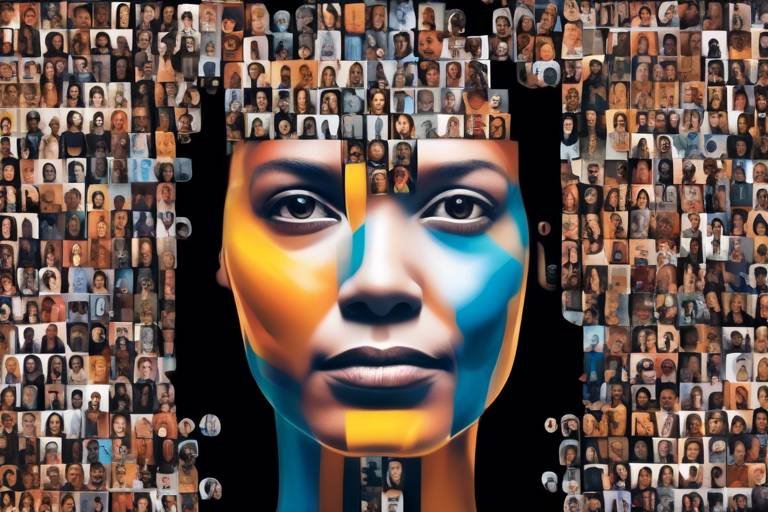The Future Frontier: Job Evolution in the Age of AI
As we stand on the brink of a technological revolution, the world of work is undergoing a seismic shift, driven primarily by the rise of artificial intelligence (AI). This transformation is not just a fleeting trend; it's a fundamental change that is reshaping the job landscape across various industries. From automating mundane tasks to enhancing decision-making processes, AI is set to redefine how we work and the skills we need to thrive in this new environment. But what does this mean for you, the worker or the employer? Understanding the implications of AI on employment is crucial for navigating this evolving frontier.
While the introduction of AI may spark fears of job displacement, it also opens the door to a plethora of new opportunities. Imagine a world where repetitive tasks are handled by machines, allowing human workers to focus on more complex and creative endeavors. This dual impact of AI—displacement and creation—requires a proactive approach from both employees and employers. Workers need to adapt and reskill, while companies must rethink their workforce strategies to leverage AI effectively.
To illustrate this transformation, consider the following table that outlines the potential impacts of AI on various job sectors:
| Industry | Impact of AI |
|---|---|
| Healthcare | AI can assist in diagnostics, patient management, and personalized medicine, creating roles for AI specialists and data analysts. |
| Manufacturing | Automation may reduce the need for manual labor but increases demand for technicians and engineers to maintain AI systems. |
| Finance | AI enhances fraud detection and risk assessment, leading to a need for compliance officers and data scientists. |
| Retail | AI can optimize inventory management and customer service, creating roles in data analysis and customer experience design. |
As we dive deeper into the world of AI, it's essential to recognize that the skills required for future employment are evolving as well. Workers must embrace a mindset of continuous learning to stay relevant. This means not only acquiring technical skills but also honing soft skills that AI cannot replicate. In the coming sections, we will explore the emerging job roles in AI, the importance of reskilling and upskilling, and how soft skills play a pivotal role in an AI-driven world.
As we explore the future of jobs in the age of AI, many questions arise. Here are some common queries:
- Will AI take away my job? - While some jobs may be automated, new roles will also emerge that require human skills.
- What skills should I focus on to remain competitive? - Focus on both technical skills, like data analysis, and soft skills, like creativity and emotional intelligence.
- How can I reskill effectively? - Online courses, workshops, and corporate training programs are excellent resources for reskilling.
- What industries will see the most job growth due to AI? - Healthcare, finance, and technology are expected to see significant growth in AI-related job roles.

The Impact of AI on Employment
Artificial Intelligence (AI) is not just a buzzword; it's a transformative force reshaping the landscape of employment across the globe. As we stand at this technological crossroads, it’s essential to understand how AI is influencing job roles, industries, and the very nature of work itself. While some may fear that AI will lead to widespread job losses, the reality is more nuanced. AI is indeed displacing certain roles, but it is also creating a plethora of new opportunities that didn’t exist before. This duality means that both workers and employers must adapt to this evolving environment.
To grasp the full impact of AI on employment, let’s break it down into a few key areas:
- Job Displacement: Routine and repetitive tasks are increasingly being automated. Roles in manufacturing, data entry, and even some aspects of customer service are at risk. This shift raises concerns about job security for many workers.
- Job Creation: On the flip side, AI is giving rise to new job categories. For instance, positions such as AI trainers, machine learning engineers, and data ethicists are emerging as essential roles in the tech landscape.
- Skill Shifts: The demand for skills is changing. Employers are now prioritizing candidates who possess not only technical skills but also soft skills like creativity and emotional intelligence. This shift underscores the importance of reskilling and upskilling in the workforce.
It’s crucial for businesses to recognize that AI can enhance human capabilities rather than replace them entirely. For example, AI can analyze large data sets far more efficiently than a human could, but it still requires human insight to interpret the results and make strategic decisions. This partnership between humans and machines is where the real magic happens.
Moreover, the impact of AI on employment varies significantly across different industries. For instance, healthcare professionals are seeing AI tools that assist in diagnostics and patient care, allowing them to focus more on patient interaction and less on administrative tasks. In contrast, sectors like retail are experiencing a more direct impact, with automated checkouts and inventory management systems taking over traditional roles.
As we navigate this AI-driven era, it’s clear that understanding the implications of these technological advancements is imperative for both employees and employers. Workers must become lifelong learners, constantly updating their skill sets to stay relevant. Employers, on the other hand, should foster a culture of adaptability and innovation, ensuring their teams are prepared for the future.
Q: Will AI replace all jobs?
A: While AI will automate certain tasks, it will also create new job opportunities. The focus will shift towards roles that require human skills such as creativity, critical thinking, and emotional intelligence.
Q: What skills should I develop to stay relevant in the job market?
A: Emphasizing both technical skills (like data analysis and programming) and soft skills (such as communication and teamwork) will be key to thriving in an AI-augmented job market.
Q: How can companies prepare their workforce for AI integration?
A: Companies can invest in training programs and promote a culture of continuous learning to help employees adapt to new technologies and methodologies.

Emerging Job Roles in AI
As artificial intelligence continues to evolve at a breakneck pace, it's not just the technology that's changing; the job landscape is being reshaped in profound ways. New roles are emerging that were once the stuff of science fiction, and they are becoming increasingly relevant in today's job market. Imagine a world where your job title could be "AI Interaction Designer" or "Machine Learning Ethicist." These positions are not only fascinating but are also critical in ensuring that AI technologies are developed and implemented responsibly.
One of the most exciting aspects of this transformation is the variety of new job roles that are popping up. For instance, AI Trainers are becoming essential as they help teach AI systems to understand human language, emotions, and context. This role involves curating datasets and refining algorithms to improve AI performance. Similarly, AI Business Strategists are stepping into the spotlight, helping companies integrate AI into their business models effectively. They analyze market trends and identify opportunities where AI can create value, ensuring that organizations stay ahead of the curve.
But it doesn't stop there. The rise of AI is also giving birth to Robotics Process Automation (RPA) Developers, who design software robots to automate repetitive tasks. This role is crucial for businesses looking to enhance efficiency and reduce operational costs. The demand for these professionals is skyrocketing as companies realize the potential of AI-driven automation.
Here's a brief overview of some of the most promising emerging job roles in the AI landscape:
| Job Role | Description |
|---|---|
| AI Interaction Designer | Designs user-friendly interfaces for AI systems, focusing on human interaction. |
| Machine Learning Ethicist | Ensures that AI systems operate within ethical boundaries and promote fairness. |
| AI Trainer | Teaches AI systems to understand and respond to human inputs effectively. |
| AI Business Strategist | Helps organizations integrate AI into their business models for better outcomes. |
| RPA Developer | Creates software robots to automate routine tasks, improving efficiency. |
These emerging roles reflect a shift in how we perceive work in the age of AI. It's essential to recognize that while technology is automating certain tasks, it is also generating a plethora of new opportunities that require human creativity, critical thinking, and emotional intelligence. As we move forward, professionals who can adapt to these changes and embrace lifelong learning will be the ones who thrive in this dynamic environment.
In conclusion, the future is bright for those willing to explore these new job roles in AI. By staying informed and continuously developing your skills, you can position yourself at the forefront of this exciting evolution in the workforce.
- What skills are needed for emerging AI job roles? Skills such as data analysis, programming, and a solid understanding of AI technologies are crucial, along with soft skills like creativity and communication.
- How can I prepare for a career in AI? Consider enrolling in courses related to AI, machine learning, or data science. Online platforms and boot camps offer great resources for learning.
- Are there any ethical concerns regarding AI jobs? Yes, roles like AI Ethics Officers are essential to ensure that AI technologies are developed and used responsibly, addressing concerns such as bias and privacy.

Data Scientists and Analysts
The demand for data scientists and analysts is skyrocketing as businesses increasingly recognize the value of data-driven insights. In a world where information is generated at an unprecedented rate, organizations are eager to harness this wealth of data to inform their strategic decisions. Imagine being a detective, piecing together clues from a vast ocean of information to uncover hidden patterns and trends that can propel a company forward. This is the essence of what data scientists do. They sift through complex data sets, employing advanced analytical techniques to extract meaningful insights that can guide business strategies, enhance customer experiences, and improve operational efficiency.
However, it's not just about crunching numbers; it's about storytelling through data. Data scientists must communicate their findings in a way that resonates with stakeholders, turning raw data into compelling narratives that drive action. This often requires a blend of technical skills and creative thinking. For instance, they might use data visualization tools to create engaging charts and graphs that make complex information more digestible. The ability to translate complex analytical concepts into clear, actionable insights is what sets successful data scientists apart from their peers.
To excel in this field, aspiring data scientists need to build a strong foundation in several key areas. These include:
- Statistics: Understanding statistical methods is crucial for analyzing data and drawing valid conclusions.
- Programming: Proficiency in programming languages like Python or R is essential for manipulating and analyzing data effectively.
- Data Visualization: The ability to present data visually helps in conveying insights clearly and persuasively.
As the landscape of data science continues to evolve, professionals must commit to continuous learning. New tools, techniques, and methodologies are constantly emerging, and staying updated is vital for maintaining a competitive edge. Whether it's through formal education or self-directed learning, the journey of a data scientist is one of perpetual growth and adaptation.
In summary, the role of data scientists and analysts is not only about technical prowess but also about creativity and communication. They are the bridge between raw data and actionable insights, helping organizations navigate the complexities of the modern data landscape. As we move further into the age of AI, the importance of these roles will only continue to rise, making it an exciting time to embark on a career in data science.
- What qualifications do I need to become a data scientist? Generally, a degree in computer science, statistics, or a related field is beneficial. However, many successful data scientists come from diverse educational backgrounds.
- Is programming necessary for data science? Yes, programming skills are essential, particularly in languages such as Python and R, which are widely used in data analysis.
- How can I gain experience in data science? Consider internships, online courses, or personal projects that allow you to apply your skills in real-world scenarios.

Skills Required for Data Science
In the fast-paced world of data science, possessing the right skills is not just an advantage; it’s a necessity. As businesses increasingly rely on data-driven insights to guide their strategies, the demand for skilled data scientists has surged. But what exactly does it take to succeed in this field? First and foremost, a solid foundation in statistics is essential. Understanding statistical methods allows data scientists to interpret data accurately and make informed predictions. Without this knowledge, one might as well be navigating a ship without a compass!
Next up is programming. Proficiency in programming languages such as Python or R is crucial for manipulating data and building algorithms. These languages are the tools of the trade, enabling data scientists to clean, analyze, and visualize data effectively. Think of programming as the language of the data world; without it, communication with data becomes impossible.
Moreover, data visualization skills cannot be overlooked. The ability to present data in a clear and compelling manner is vital. It’s not enough to analyze data; one must also convey the findings to stakeholders who may not have a technical background. Tools like Tableau or Matplotlib are invaluable here, transforming complex datasets into understandable visuals. Imagine trying to explain a complex concept without visuals – it would be like telling a story without any pictures!
Aside from technical skills, the field of data science is ever-evolving, making continuous learning a critical component for success. Data scientists must stay updated with the latest tools, technologies, and methodologies. This could involve taking online courses, attending workshops, or participating in webinars. The landscape of data science is akin to a river that’s constantly changing; those who do not adapt will find themselves left behind.
To summarize, the skills required for data science can be categorized into three main areas:
- Statistical Knowledge: Understanding statistical methods and principles.
- Programming Proficiency: Mastery of languages like Python or R.
- Data Visualization: Ability to present data effectively using visualization tools.
By honing these skills, aspiring data scientists can position themselves for success in a field that promises to be both challenging and rewarding. It’s not just about crunching numbers; it’s about telling stories through data, making sense of chaos, and driving decisions that can change the course of businesses.
1. What programming languages should I learn for data science?
The most popular programming languages for data science are Python and R. Both offer extensive libraries and frameworks that facilitate data analysis and machine learning.
2. Is a degree necessary to become a data scientist?
While a degree in a related field can be beneficial, many successful data scientists come from various educational backgrounds. Practical experience and skill proficiency can often outweigh formal education.
3. How important is networking in the data science field?
Networking is crucial. Engaging with other professionals can lead to job opportunities, collaborations, and insights into industry trends. Joining data science communities and attending conferences can be incredibly beneficial.
4. What are the best resources for learning data science?
There are many excellent resources available, including online platforms like Coursera, edX, and Udacity, as well as books and tutorials that cater to different skill levels.

Career Pathways in Data Science
Embarking on a career in data science can feel like stepping into a vast, uncharted territory. With the digital age generating an overwhelming amount of data daily, the demand for skilled data scientists is at an all-time high. But how does one navigate the myriad of pathways leading to this exciting field? The journey often begins with a solid educational foundation. Many aspiring data scientists pursue degrees in computer science, statistics, or related fields. These programs equip students with essential knowledge in data handling, statistical analysis, and programming languages like Python and R.
However, a traditional degree isn’t the only route to success. Specialized boot camps and online courses have emerged as viable alternatives, offering intensive training designed to fast-track individuals into the workforce. These programs often focus on practical skills and real-world applications, making them attractive for those looking to switch careers or enhance their existing skill sets. For instance, platforms like Coursera and Udacity provide courses that cover everything from basic data manipulation to advanced machine learning techniques.
Moreover, networking plays a crucial role in this field. Joining data science communities, attending workshops, and participating in hackathons can open doors to job opportunities and collaborations. Many professionals find that connecting with others in the industry not only provides valuable insights but can also lead to mentorship opportunities. This is particularly important in a field that evolves as rapidly as data science.
In addition to formal education and networking, gaining practical experience through internships or projects is vital. Many companies value hands-on experience just as much as academic credentials. Engaging in real-world projects, whether through internships or personal initiatives, allows aspiring data scientists to build a portfolio that showcases their skills and problem-solving capabilities. This portfolio can be a game-changer during job interviews, demonstrating not just theoretical knowledge but also the ability to apply that knowledge effectively.
In summary, the career pathways in data science are diverse and flexible. Whether through traditional degrees, online courses, or self-directed projects, there are multiple avenues to enter this dynamic field. The key is to remain committed to learning and adapting, as the landscape continues to evolve rapidly. With dedication and the right resources, anyone can carve out a successful career in data science.
- What qualifications do I need to become a data scientist? Most data scientists have a background in mathematics, statistics, or computer science, but many also come from diverse fields with strong analytical skills.
- Are online courses sufficient for a career in data science? Yes, many online courses provide the necessary skills and knowledge to start a career in data science, especially if complemented with hands-on projects.
- How important is networking in data science? Networking is crucial in data science, as it can lead to job opportunities, mentorship, and collaborations that can enhance your career.
- What programming languages should I learn for data science? Python and R are the most commonly used programming languages in data science, along with SQL for database management.

AI Ethics and Compliance Officers
As artificial intelligence continues to permeate various sectors, the role of has emerged as a crucial pillar in ensuring that technology is developed and utilized responsibly. These professionals are tasked with navigating the complex landscape of ethical considerations surrounding AI applications. They are not just the gatekeepers of compliance; they are also the champions of fairness, accountability, and transparency in AI systems.
Their responsibilities often include assessing AI algorithms for bias, ensuring adherence to legal standards, and developing frameworks that guide ethical AI deployment. Imagine being on a ship navigating through uncharted waters; the AI Ethics Officer serves as the navigator, ensuring that the vessel stays on course and avoids treacherous pitfalls that could lead to ethical breaches or public backlash.
In a world where decisions are increasingly driven by algorithms, the role of these officers becomes even more significant. They must possess a keen understanding of both technology and human values. This dual expertise allows them to bridge the gap between technical capabilities and ethical implications, ensuring that AI serves the greater good rather than perpetuating existing inequalities.
To give you a clearer picture of what this role entails, here are some of the key functions of AI Ethics and Compliance Officers:
- Policy Development: Crafting guidelines that govern the ethical use of AI within organizations.
- Risk Assessment: Evaluating potential risks associated with AI technologies and recommending mitigation strategies.
- Training and Awareness: Educating teams about ethical AI practices and the importance of compliance.
- Stakeholder Engagement: Collaborating with various stakeholders, including legal teams, technical staff, and external regulators.
As we move forward, the demand for AI Ethics and Compliance Officers is expected to grow exponentially. Companies will increasingly recognize that ethical lapses can lead to significant reputational damage and legal repercussions. Therefore, investing in this role is not just a matter of compliance; it's a strategic necessity. Just as a ship needs a skilled crew to navigate, businesses will need ethical officers to guide them through the complexities of AI integration.
In conclusion, AI Ethics and Compliance Officers are not merely an addition to the organizational chart; they are essential for fostering a culture of responsible innovation. As AI continues to evolve, so too will the ethical frameworks that govern its use, making this role one of the most dynamic and impactful in the tech landscape.
What is the role of AI Ethics and Compliance Officers?
AI Ethics and Compliance Officers ensure that AI technologies are developed and implemented responsibly, focusing on ethical considerations, compliance with regulations, and risk management.
Why is the role of AI Ethics and Compliance Officers important?
As AI becomes more integrated into various industries, ethical lapses can lead to serious repercussions, including legal issues and reputational damage. These officers help mitigate those risks.
What skills are needed to become an AI Ethics and Compliance Officer?
A combination of technical knowledge in AI, strong analytical skills, and a deep understanding of ethical principles and legal standards is essential for this role.
How can companies benefit from hiring AI Ethics and Compliance Officers?
By hiring these professionals, companies can ensure responsible AI use, foster trust with stakeholders, and avoid potential legal and ethical pitfalls.

Reskilling and Upskilling for the Future
In a world where technology is evolving at breakneck speed, the need for reskilling and upskilling has never been more critical. As artificial intelligence and automation reshape the job landscape, professionals must take proactive steps to stay relevant and competitive. But what does this mean for you? Simply put, it’s about embracing a mindset of continuous learning. Imagine your career as a garden; without regular care and attention, it can quickly become overrun with weeds. In the same way, without updating your skills, you risk being left behind in the rapidly changing job market.
Reskilling refers to learning new skills to transition into a different role, while upskilling focuses on enhancing your existing skills to advance in your current position. Both are essential strategies for navigating the complexities of today’s workforce. For instance, a marketing professional may need to learn data analytics to better understand consumer behavior, while a software engineer may want to deepen their knowledge of AI to remain competitive in their field. The key is to identify the skills gap in your industry and take action to fill it.
Fortunately, there are numerous resources available to help you on this journey. Online learning platforms have exploded in popularity, offering a plethora of courses that cater to various skill levels and career aspirations. Websites like Coursera and Udacity provide flexible learning options that allow you to learn at your own pace. You can explore topics ranging from coding and data science to digital marketing and project management. The beauty of these platforms is that they offer you the chance to learn from experts in the field without the hefty price tag of traditional education.
In addition to online courses, many companies are recognizing the importance of investing in their workforce. Corporate training initiatives are becoming more common as organizations strive to equip their employees with the necessary tools to thrive in an AI-centric future. These programs not only enhance employee skills but also foster a culture of innovation and adaptability. When companies prioritize learning, they create an environment where employees feel valued and empowered to grow.
As you consider your own path to reskilling and upskilling, think about the skills that will be most valuable in the future. Here are a few areas to focus on:
- Technical Skills: Proficiency in programming languages, data analysis, and AI technologies.
- Soft Skills: Enhancing emotional intelligence, creativity, and critical thinking abilities.
- Industry-Specific Knowledge: Staying updated on trends and developments in your field.
By investing time and effort into reskilling and upskilling, you’re not just preparing for the future; you’re actively shaping it. Think of yourself as an artist, continually refining your craft to create a masterpiece. The more tools and techniques you have at your disposal, the more capable you become of adapting to whatever challenges lie ahead. So, don’t wait for change to happen—be the change. Embrace the journey of learning and watch your career flourish.
Q: What is the difference between reskilling and upskilling?
A: Reskilling involves learning new skills for a different job role, while upskilling focuses on enhancing existing skills to advance in your current position.
Q: How can I find the right online courses for my career?
A: Start by identifying the skills that are in demand in your industry. Then, explore reputable online learning platforms that offer courses tailored to those skills.
Q: Are corporate training programs effective?
A: Yes! Many companies see significant improvements in employee performance and satisfaction when they invest in training programs.
Q: How often should I reskill or upskill?
A: Continuously! The job market is always evolving, so it’s important to stay updated on industry trends and regularly seek opportunities for learning.

Online Learning Platforms
In today's fast-paced world, have emerged as a beacon of opportunity for individuals eager to enhance their skills and stay relevant in an ever-evolving job market. These platforms offer a wealth of resources that cater to diverse learning styles and career aspirations. Imagine being able to learn from the comfort of your home, at your own pace, and with access to some of the best instructors in the field. Sounds appealing, right?
One of the most significant advantages of online learning is its accessibility. Whether you're a busy professional juggling work and family or a student seeking to supplement your education, these platforms provide a flexible solution. With just a few clicks, you can enroll in courses ranging from data science to AI ethics, and everything in between. This democratization of education means that anyone with an internet connection can tap into high-quality learning resources.
Moreover, many online platforms utilize innovative teaching methods, incorporating videos, interactive quizzes, and community forums to create an engaging learning experience. For example, platforms like Coursera and Udemy not only offer courses from top universities but also allow learners to interact with peers and instructors, fostering a sense of community. This interaction can be invaluable, as it provides opportunities to ask questions, share insights, and collaborate on projects. In fact, many learners find that the community aspect enhances their understanding and retention of the material.
| Platform | Key Features | Popular Courses |
|---|---|---|
| Coursera | University partnerships, Certificates, Peer reviews | Machine Learning, Data Science, AI Fundamentals |
| Udemy | Wide range of topics, Lifetime access, User reviews | Web Development, Digital Marketing, Personal Development |
| edX | MicroMasters programs, University credits, Professional certificates | Computer Science, Business Management, Artificial Intelligence |
While the variety of courses is impressive, it's essential to choose the right platform that aligns with your learning objectives. Consider factors such as course content, instructor credentials, and the community's engagement level. For instance, if you’re particularly interested in data science, opting for a platform that offers specialized courses with hands-on projects can significantly enhance your learning experience.
As we navigate through the complexities of the AI-driven job market, embracing online learning is not just an option—it’s a necessity. The skills you acquire today can open doors to exciting career opportunities tomorrow. So, why wait? Dive into the world of online learning and equip yourself with the tools you need to thrive in the future!
- What are online learning platforms?
Online learning platforms are websites or applications that provide educational courses, resources, and tools for learners to study various subjects at their own pace. - How do I choose the right online learning platform?
Consider factors such as course offerings, instructor expertise, user reviews, and the learning format that best suits your needs. - Are online courses recognized by employers?
Many employers recognize online courses, especially those from reputable institutions. However, always research the specific course or certification's credibility. - Can I learn at my own pace?
Yes! Most online learning platforms allow you to learn at your own pace, making it easier to balance your studies with other commitments.

Corporate Training Initiatives
In today's fast-paced world, organizations are recognizing the immense value of investing in to prepare their workforce for the challenges posed by artificial intelligence. These programs are not just a trend; they are becoming a necessity as companies strive to stay competitive in an AI-driven market. By equipping employees with the right skills, businesses can foster a culture of innovation and adaptability, which are crucial for navigating the complexities of modern work environments.
Corporate training initiatives often encompass a variety of learning formats, including workshops, online courses, and hands-on projects. For instance, companies may partner with educational institutions or utilize online platforms to provide employees with access to the latest knowledge and tools in AI and data analytics. This approach not only enhances employees' technical skills but also encourages them to think critically and creatively, which are essential in a landscape increasingly dominated by machines.
Moreover, these training programs can be tailored to meet the specific needs of different departments within an organization. For example, a marketing team might focus on data analytics to better understand customer behavior, while the IT department might delve into advanced AI programming. By customizing training, companies ensure that their workforce is not only knowledgeable but also well-prepared to tackle the unique challenges of their roles.
To illustrate the impact of corporate training initiatives, consider the following table showcasing various training programs and their benefits:
| Training Program | Target Skill | Benefits |
|---|---|---|
| Data Analytics Bootcamp | Data Interpretation | Improved decision-making and strategic planning. |
| AI Ethics Workshop | Ethical AI Practices | Ensures responsible AI development and deployment. |
| Creative Problem-Solving Seminar | Innovative Thinking | Encourages out-of-the-box solutions and collaboration. |
In addition to enhancing individual skills, corporate training initiatives also promote a sense of community and teamwork within the organization. When employees engage in training together, they build relationships and learn from one another, fostering a collaborative environment that is essential for success in the AI age. This shared learning experience can lead to increased morale and job satisfaction, which are vital for retaining top talent.
Ultimately, investing in corporate training initiatives is not just about keeping up with technological advancements; it’s about preparing a workforce that is agile, innovative, and future-ready. Companies that prioritize employee development are not only enhancing their operational capabilities but are also positioning themselves as leaders in their industry, ready to tackle the challenges and opportunities that AI presents.
- What are corporate training initiatives?
Corporate training initiatives are programs designed to enhance the skills and knowledge of employees, particularly in areas relevant to their job roles and the evolving demands of the market. - Why are corporate training initiatives important?
These initiatives are crucial for keeping employees updated with the latest skills, improving productivity, fostering innovation, and ensuring that organizations remain competitive in a rapidly changing landscape. - How can companies implement effective training programs?
Companies can implement effective training programs by assessing the specific needs of their workforce, partnering with educational institutions, utilizing online learning platforms, and encouraging a culture of continuous learning.

The Role of Soft Skills in an AI World
In a world increasingly dominated by artificial intelligence, the importance of soft skills cannot be overstated. While technical skills are essential for navigating the complexities of AI technologies, it is the soft skills that truly set individuals apart in the workplace. Think of it this way: if technical skills are the engine of a car, soft skills are the steering wheel. They guide how we interact, collaborate, and innovate in a rapidly changing environment.
As automation takes over repetitive and mundane tasks, the demand for human-centric skills is on the rise. Employers are now prioritizing candidates who can demonstrate creativity, emotional intelligence, and critical thinking. These skills are crucial for navigating the nuances of human interaction and fostering a collaborative work environment. For instance, imagine a team working on an AI project. The technical team may have the expertise to build the software, but it’s the project manager with strong emotional intelligence who can navigate team dynamics and ensure everyone is on the same page.
Moreover, the ability to adapt and pivot in response to new challenges is a game changer in the AI landscape. Professionals who can embrace change and remain flexible are more likely to thrive. In fact, a study by LinkedIn found that 92% of talent professionals believe that soft skills are just as important, if not more so, than hard skills. This statistic highlights a growing recognition that the workplace of the future will require a blend of both to succeed.
Collaboration and teamwork are also vital in an AI-driven world. As machines take over routine tasks, the ability to work effectively with others becomes increasingly important. Teams that can leverage diverse perspectives will be better equipped to drive innovation and solve complex problems. It’s no longer just about individual performance; it’s about how well you can work with others to achieve a common goal. In this sense, soft skills act as the glue that holds teams together, fostering an environment where creativity and collaboration can flourish.
To illustrate the importance of soft skills, here’s a quick overview of some key soft skills that are becoming increasingly valuable:
| Soft Skill | Description |
|---|---|
| Emotional Intelligence | The ability to understand and manage your own emotions, as well as the emotions of others. |
| Creativity | The capacity to think outside the box and generate innovative solutions to problems. |
| Critical Thinking | The ability to analyze information objectively and make reasoned judgments. |
| Adaptability | The readiness to adjust to new conditions and embrace change. |
| Collaboration | The skill to work effectively with others towards a common goal. |
In conclusion, as we navigate the complexities of an AI-driven world, soft skills will play a pivotal role in determining who stands out in the job market. By honing these skills, professionals can not only enhance their employability but also contribute to a more innovative and collaborative workplace. So, whether you're a recent graduate or a seasoned professional, investing in your soft skills is just as crucial as acquiring technical knowledge. The future belongs to those who can blend the two.
- What are soft skills? Soft skills are personal attributes that enable someone to interact effectively and harmoniously with other people.
- Why are soft skills important in an AI world? Soft skills help individuals collaborate, innovate, and navigate the complexities of human interactions that machines cannot replicate.
- How can I improve my soft skills? Engaging in team activities, seeking feedback, and practicing active listening are great ways to enhance your soft skills.
- Are soft skills more important than technical skills? Both are essential; however, soft skills are increasingly recognized as critical for teamwork and innovation in the workplace.

Collaboration and Teamwork
In today's fast-paced work environment, have become more than just buzzwords; they're essential ingredients for success. As automation takes over routine tasks, the human element—our ability to work together—becomes increasingly invaluable. Imagine a well-oiled machine, where every cog and wheel operates in harmony; that's what effective teamwork looks like in the corporate world. The ability to collaborate not only enhances productivity but also fosters innovation, allowing teams to tackle complex problems more effectively.
Think about it: when diverse minds come together, they bring a variety of perspectives, experiences, and ideas to the table. This melting pot of creativity can lead to breakthroughs that a single individual might not achieve alone. For instance, consider a team working on an AI project. Each member may have a different expertise—data analysis, coding, design, or ethical considerations. By pooling their knowledge, they can create a more robust and comprehensive solution. In this context, collaboration becomes a catalyst for innovation.
Moreover, the rise of remote work has only heightened the importance of these skills. Teams are often spread across different locations and time zones, making effective communication and collaboration more challenging yet more critical than ever. Tools like Slack, Zoom, and Trello have emerged as lifelines that help teams stay connected, share ideas, and track progress. However, the technology alone isn't enough; team members must actively engage and cultivate a culture of trust and openness to maximize their collaborative efforts.
To thrive in an AI-driven job market, professionals must not only possess technical prowess but also excel in soft skills. Here are some key aspects of collaboration that can make a significant difference:
- Effective Communication: Clear and concise communication reduces misunderstandings and keeps everyone on the same page.
- Conflict Resolution: Disagreements are natural, but how a team navigates these conflicts can either strengthen or weaken their dynamics.
- Shared Goals: When everyone is aligned towards a common objective, teamwork becomes more purposeful and focused.
In summary, as we venture further into the age of AI, the ability to collaborate effectively will distinguish successful professionals from the rest. Teams that can harness diverse viewpoints and work cohesively will not only solve problems more efficiently but also drive their organizations toward greater innovation and success. So, whether you're a seasoned professional or just starting your career, honing your collaboration skills could be your ticket to thriving in this new landscape.
- Why is collaboration important in the age of AI? Collaboration enhances problem-solving and innovation, allowing teams to leverage diverse perspectives to create better solutions.
- How can I improve my collaboration skills? Focus on effective communication, active listening, and being open to feedback. Participating in team projects can also help you develop these skills.
- What tools can help with team collaboration? Tools like Slack, Zoom, and Trello are great for facilitating communication and project management in remote or hybrid teams.

Adaptability and Flexibility
In today's ever-evolving job market, adaptability and flexibility are not just buzzwords; they are essential traits for success. Imagine a ship navigating through turbulent waters—those who can adjust their sails in response to changing winds will reach their destination more efficiently. Similarly, professionals who can pivot and embrace new technologies or methodologies will thrive in the face of uncertainty. The landscape of work is shifting faster than ever, driven by advancements in artificial intelligence and automation. As a result, the ability to learn new skills and adapt to new roles is becoming increasingly valuable.
It's not just about being open to change; it's about actively seeking it out. Employers are looking for individuals who can demonstrate versatility and a willingness to grow. This means being proactive in learning and unlearning skills as the job market demands. For instance, consider how many traditional roles have been transformed by AI. Tasks that once required manual effort are now automated, and new roles have emerged that require a different set of skills. Adapting to these changes means being willing to step outside of your comfort zone and take on new challenges.
Moreover, adaptability goes hand-in-hand with continuous learning. Professionals should cultivate a mindset that embraces lifelong education. This can include pursuing formal education, attending workshops, or even engaging in self-directed learning through online courses. The key is to remain curious and open to acquiring knowledge. For example, a marketing professional may need to learn about data analytics to effectively measure campaign success in an AI-driven environment. This willingness to learn not only enhances employability but also fosters personal growth and satisfaction.
Flexibility also extends to how we approach our work environments. The rise of remote work and flexible schedules has changed the traditional 9-to-5 mindset. Companies are now recognizing the importance of work-life balance, and employees who can adapt to various working conditions—whether it's collaborating with a global team or managing their own schedules—are more likely to succeed. This adaptability can lead to greater job satisfaction and productivity, as individuals find the work arrangements that best suit their lifestyles.
In conclusion, as we navigate through the complexities of an AI-driven job landscape, adaptability and flexibility will be the compass guiding us through uncharted waters. By embracing change and committing to continuous learning, professionals can position themselves not just to survive but to thrive in this new era. Are you ready to adjust your sails and embrace the future?
- What is the importance of adaptability in the workplace?
Adaptability is crucial as it allows individuals to respond effectively to change, learn new skills, and maintain productivity in evolving work environments.
- How can I improve my adaptability skills?
You can enhance your adaptability by seeking new challenges, engaging in continuous learning, and being open to feedback and change.
- Are soft skills important in an AI-driven job market?
Yes, soft skills such as emotional intelligence, creativity, and critical thinking are increasingly valuable as they complement technical skills in collaborative and innovative environments.
Frequently Asked Questions
- How is AI impacting job employment?
AI is significantly transforming the job market by automating routine tasks and creating new job roles that require specialized skills. While some positions may become obsolete, many new opportunities are emerging, particularly in tech-driven fields.
- What are some new job roles emerging due to AI?
As AI technology evolves, roles such as Data Scientists, AI Ethics Officers, and Machine Learning Engineers are becoming increasingly important. These positions focus on data analysis, ethical AI implementation, and developing intelligent systems.
- What skills are essential for a career in data science?
A strong foundation in statistics, programming languages like Python or R, and data visualization tools is crucial for aspiring data scientists. Continuous learning and adaptability to new technologies are also vital in this fast-paced field.
- How can I reskill or upskill for an AI-driven job market?
Online learning platforms like Coursera, Udacity, and LinkedIn Learning offer a variety of courses tailored to different skill levels. Additionally, many companies are investing in corporate training initiatives to help employees develop the necessary skills.
- Why are soft skills important in the age of AI?
While technical skills are critical, soft skills like creativity, emotional intelligence, and collaboration are becoming increasingly valuable. These skills enable individuals to work effectively in teams, adapt to changes, and drive innovation.
- What role does adaptability play in future job success?
Adaptability is essential in a rapidly changing job landscape. Professionals who can pivot and embrace new technologies will be better equipped to handle challenges and seize opportunities in an AI-driven world.



















